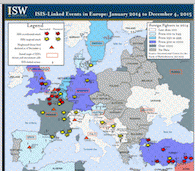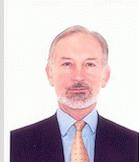Interview with American Journalist, Gilbert Doctorow, June 28, 2016
My guest today is Gilbert Doctorow, an American journalist and author based in Brussels for many years.
JB: Welcome to OpEdNews, Gilbert. Earlier in the month, coordinated terrorist attacks at the national airport and metro station left 35 dead and more than 300 injured. Being on the ground there, you're in a position to help us get a sense of the context for these attacks. Where would you like to begin?
GD: A great many global commentators have tried to explain why Muslims in Belgium might be drawn to radical teachings and jihad, since it has been remarked that the country has the highest concentration of jihadists per capita in Europe. Some of these explanations come from in-depth knowledge, others are superficial. My own area of expertise in any case is not Islam, radical or otherwise, it is how Belgium is mis-governed and why this country has been an organizing center for terrorist attacks going back to the Madrid bombings a decade ago, through the Paris attacks of November 2015 and up to the slaughter at Zaventem airport on March 22nd. The common link is the ineffective policing and judicial system of Belgium in general and Brussels in particular. And it is cause for concern not only in this country but in neighboring countries and further afield because the terrorist ambitions go way beyond what we have seen here in the last 10 days.
JB: I don't think many of us on this side of the Atlantic understand much about the Muslim presence in Europe, let alone Belgium specifically. You mentioned that the concentration of jihadists is exacerbated by "the ineffective policing and judicial system." I'd like to hear about that. Also, how did so many Muslims and their radical brethren end up in Belgium in the first place?
GD: As I explained, the Muslim question per se is not my area of expertise. However, I would like to stress one very important fact for your audience: their presence in Belgium and in France is of long standing, going back many decades when they arrived largely as economic immigrants, not as refugees from repressive regimes or as war victims. The relevance of the civil war in Syria to the present problems with Muslim terrorists is exactly the opposite of what many people may have understood at the outset. The jihadists who committed the atrocities in Paris last November and in Brussels on March 22nd were not new arrivals. They were European born and raised. As a result of their radicalization, under the influence of Wahhabi and other extremist imams and recruiters, they went to Syria to participate on the side of the anti-Assad forces, to overthrow a secular Islamic state and further the caliphate in the Middle East.
In the case of Belgium, we are speaking of several hundred radicalized young people. The problems of youth unemployment in Belgium were surely a contributing factor to their choice of life's path. But not a major factor.This is generational and pan-European, not a unique product of Belgium, Brussels and its commune of Molenbeek.
These small numbers of terrorists could exist and carry out their missions both outside and inside Belgium because of
- protection from their local community, which was alienated from the general population of Belgium by the country's foreign policy, namely participation with fellow NATO countries and their military interventions in North Africa (Libya) and the Middle East, and
- the failure of police and judicial authorities in Belgium to effectively root out their cells and disrupt their terrorist activities before they could strike
- because those same.Belgian authorities put virtually no resources in place to safeguard the public even under conditions of high alert
The last two points are a distinguishing feature of the kingdom of Belgium that I would be pleased to discuss with your audience.
JB: I understand that "the Muslim question" is not your area of expertise. Nevertheless, your explanation was very helpful. Thank you. Now, let's turn to your last two points. Please tell us more.
GD: The kingdom of Belgium is a country housing two "nations," meaning populations whose second identity either before or after being "Belgians" is: French speakers in the South and Dutch speakers in the North. In the middle is Brussels, which both nations covet as their own, and which for that reason is the only one of the country's three administrative regions that is bilingual by law. The overall population of 11 million Belgians is 55% Dutch speaking, 45% French speaking.
For more than 100 years, these two nations have been in a tug of war, or to change metaphors, have been trying to pull the blanket of political power to their side of the bed. During the last 40 years alone there have been 6 constitutional reforms, and as a consequence Belgium has moved from a unitary state with large central bureaucracy to a decentralized state with many government functions delegated to the three regions. People speak of "lasagna" scheme of governance here, because of the layers. But there is another dimension: power sharing. If there were no brakes put in place, every federal election would result in a Flemish dominated government because they are a permanent majority. That would be unacceptable to the minority, hence with help from some smart political scientists, Belgium arrived at a "Power Sharing" scheme which assures allocation of ministerial posts, seats in executive bodies on a quota system. This, plus the proportional representation system in allocating seats in the parliament means that every federal election results in negotiations to form a coalition cabinet. Holding power becomes an end in itself and coherent policies pulling in one direction are impossible. It is also impossible to respond quickly and with determination to crisis situations like we face with jihadist terror.
One more complexity and I will stop: because of the power sharing, and fight of two nations over control of Brussels, which is in fact 95% French speaking, it has been impossible to agree on formation of a unified municipal government for Brussels. It really is an agglomeration of 19 little cities, communes. They all lack the scale, lack the resources to cope with the terror threat and do proper policing.
In all of these ways, the animosity, jealousy of two nations under one roof results in a failing state, if not a truly failed state. If we have time, I can take this back 20 years to the infamous case of the paedophile and murderer Marc Dutroux when we saw the very same dysfunctionality cause a national disaster that brought several hundred thousand Belgians to the streets in protest at their government's criminal weakness.

ISIS-Linked Events in Europe: January 2014-December 4, 2015
(Image by ISW: Institute for the Study of War) Details DMCA
(Note: You can view every article as one long page if you sign up as an Advocate Member, or higher).






